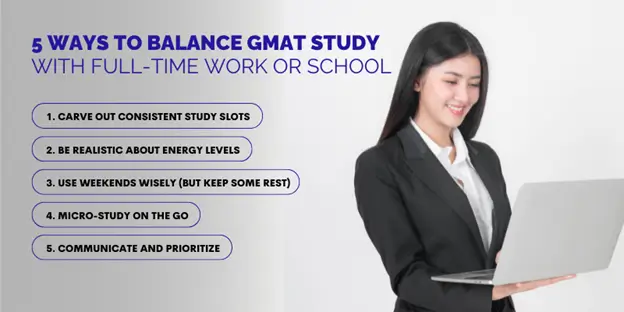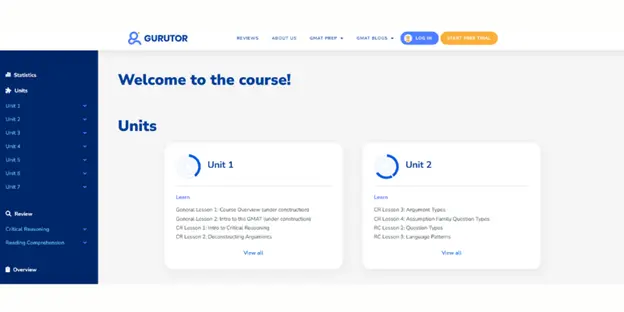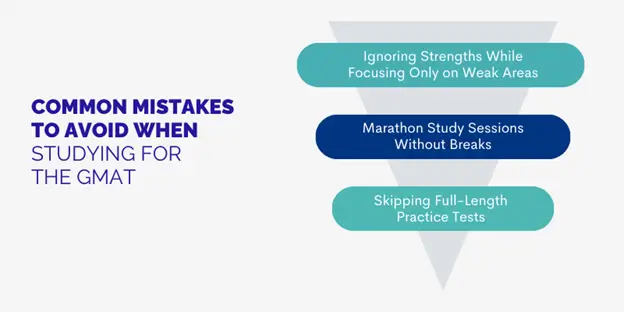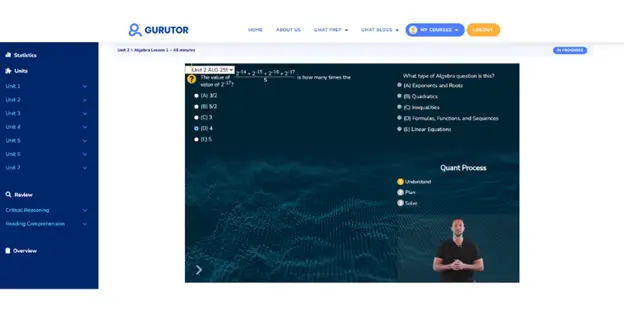How Many Hours Should I Study for the GMAT?

The GMAT is more than just another test; it’s a ticket to top MBA programs, scholarships, and long-term career opportunities.
The new GMAT Focus Edition is shorter but still tests the same high-level thinking under pressure.
That naturally raises the question every serious applicant asks: “How many hours do I need to study for the GMAT to hit my target score?”
One month or at least three months?
It depends. Your target GMAT score, baseline skills, and weekly availability, as well as how you use your time to study.
GMAT prep time isn’t about grinding endlessly; it’s about structured, feedback-driven study that moves you closer to your goals every single session.
This guide shows you how to set study hours based on your timeline, baseline, and score goal, and how to make each hour count.
Factors That Influence GMAT Study Hours

Before you craft your GMAT prep study plan, you need to understand the factors that will shape how much time you’ll actually need to invest.
- Current knowledge level
If you already handle most practice questions correctly, you’ll need fewer hours than someone starting from scratch.
- Target score
Moving into the 700+ range usually means extra practice, structured study, and focus, often roughly twice the hours someone aiming for a modest jump will log.
- Time until test day
How many weeks do you have? If you have six months, you can spread out the hours and focus on mastery. If you only have six weeks, you’ll compress the same work into far more hours per week.
- Study quality vs. quantity
Fifty focused hours beating at your true weak spots will beat 100 distracted hours. Use active practice (timed sets, reviewing every mistake, and targeted drills) and avoid passive re-reading.
Recommended GMAT Study Hours by Time Frame
While individual needs vary, the following guidelines are recommended GMAT study plans based on common preparation timelines.
1. 3-Month Study Plan
Aim for 15–20 hours/week (approximately 2–3 hours on weekdays, with longer sessions on weekends).
Over 12 weeks, this totals 180–240 hours, a steady pace that supports concept building, deliberate practice, and regular full-lengths.
This is a common and doable schedule for working professionals.
| Weeks | Weekly hours | Daily (example) | Focus breakdown (weekly hours) | Full-lengths & checkpoints | Primary goals that week |
| 1–4 | 15–18 | 2–3 hr weekdays, 4–6 hr weekend | Quant: 5–6; Verbal: 4–5; Data Insights: 2–3; Review & drills: 3 | 1 official full-length at the end of week 4; diagnostic week 1 | Build foundations, fix core math/grammar gaps |
| 5–8 | 15–20 | Same split | Quant: 6–7; Verbal: 5–6; Data Insights: 2–3; Review: 2–3 | 1 full-length at the end of week 8; begin timed section practice | Increase timed accuracy; learn a strategy for each question type |
| 9–12 | 15–20 | Focus on weak areas, reduce new learning | Quant: 5–6; Verbal: 5–6; Data Insights: 3; Review/Mocks: 3–4 | 2 full-lengths in the final 4 weeks (one with test-day setup) | Polished timing/strategy, final error logs, test-day routines |
2. 2-Month Study Plan
Aim for 25–30 hours/week (roughly 4–5 hours most days).
This is an intensive schedule suited to someone with some existing foundation who needs to polish and scale quickly.
| Weeks | Weekly hours | Daily (example) | Focus breakdown (weekly hours) | Full-lengths & checkpoints | Primary goals that week |
| 1–2 | 25–30 | 3–5 hr weekdays, 5–8 hr weekend | Quant: 8–10; Verbal: 6–8; Data Insights: 3–4; Review: 4 | Diagnostic at start; 1 full-length at the end of week 2 | Rapid gap closure; intensive concept work |
| 3–6 | 25–30 | Sustained daily focus | Quant: 9–10; Verbal: 7–8; Data Insights: 3–4; Review/Drills: 4 | 2 full-lengths (every 2 weeks) | Convert accuracy to speed; practice under strict timing |
| 7–8 | 25–30 | Taper new learning, increase mocks | Quant: 6–8; Verbal: 6–8; Data Insights: 4; Mocks/Review: 6 | 2 full-length final two weeks | Peak performance: review, timing, and test sim |
3. 1-Month (Crash) Study Plan
This model is a sprint, which is reasonable if you’re retaking GMAT soon or have only a short window, but it risks burnout and requires disciplined recovery and realistic expectations.
Use only if you already have a solid foundation or are forced by deadlines.
| Weeks | Weekly hours | Daily (example) | Focus breakdown (weekly hours) | Full-lengths & checkpoints | Primary goals that week |
| 1 | 40–50 | 6–8 hr daily | Quant: 16–18; Verbal: 12–14; Data Insights: 6–8; Review: 6 | Diagnostic day 1; 1 official full-length at the end of week 1 | Rapidly identify remaining gaps and drill high-leverage topics |
| 2 | 40–50 | Intense practice & timed sets | Quant: 15–18; Verbal: 12–15; Data Insights: 6–8; Mocks: 4–6 | 1 full-length mid-week, 1 at the end | Shape timing, convert accuracy under fatigue |
| 3–4 | 40–50 | Shift toward mocks & review | Quant: 12–16; Verbal: 12–16; Data Insights: 6–8; Mocks/Review: 8–10 | 3–4 full-lengths across the final 2 weeks | Peak, polish, and simulate test-day conditions |
Treat these as guidelines, not rules.
However, if you have a six-month window:
It allows you to space out learning (for better retention), run repeated full-lengths under real conditions, and address real weaknesses instead of masking them.
That said, with Gurutor’s 6-month GMAT study plan, you’re not locked into a rigid calendar; you’re guided by a system that adapts to your pace.
Every session is feedback-driven, so instead of just “putting in the hours,” you’re correcting mistakes, reinforcing strengths, and staying on track for a high score.
Balancing GMAT Study with Full-Time Work or School

Most GMAT aspirants aren’t studying in a vacuum; they’re managing a full-time job, schoolwork, or other major commitments.
The good news: you can absolutely achieve a good GMAT score with a busy schedule. Here’s how:
1. Carve Out Consistent Study Slots
Treat GMAT prep like a standing meeting with yourself.
Block off the GMAT study schedule in your calendar. For example:
- 7:00–9:00 AM before work
- Lunch break drills
- Evenings for a 90-minute focused session
For working professionals (40+ hrs/week), 10–15 hrs/week is realistic.
That might mean ~2 hours on weekday evenings plus 4–5 hours across the weekend.
Over three months, that adds up to ~150 hours, enough for a strong outcome if used well.
2. Be Realistic About Energy Levels
Don’t set an unsustainable schedule.
Promising yourself 4 hours after a long workday usually backfires, as only a few people actually follow through on that. Instead:
- Aim for short, high-quality sessions (e.g., 90 minutes of deep focus).
- End on a high note instead of dragging through exhaustion.
- Remember: after ~2 hours of intense study, retention drops sharply.
3. Use Weekends Wisely (But Keep Some Rest)
Weekends are prime GMAT time, but don’t sacrifice all recovery. Try:
- Saturday morning = full-length practice test
- Sunday afternoon = review + drills
Even 4 hours of focused weekend study leaves room for errands and downtime.
4. Micro-Study on the Go
Leverage “pocket time”:
- An online study platform like Gurutor lets you turn commute time into productive prep.
- A Critical Reasoning problem while waiting for a meeting.
- Quick review before class starts.
These mini-sessions keep material fresh, but don’t replace your deeper blocks of study.
5. Communicate and Prioritize
Let people around you know your study windows are non-negotiable.
Minimize distractions by finding a quiet spot (library, coffee shop, closed-door room). Also, decide what can be deprioritized temporarily, such as less Netflix and fewer side hobbies.
Gurutor’s Edge for Busy Schedules
The hardest part for working professionals and students is staying consistent when life throws curveballs, deadlines, travel, and unexpected commitments.
This is where Gurutor helps by letting you pick up right where you left off, without losing momentum.

Each question comes with explanations and even alternative methods, so you don’t just see what’s right, you learn why it’s right and how to approach it differently next time.
How to Optimize Your Study Hours
It’s not just how many hours you study, but how you use those hours
Here’s how to make every hour count:
1. Focus on Your Weak Areas
It’s tempting to spend time on what feels easy, but that’s rarely where the score gains are.
Start with a test to pinpoint your weak spots, whether it’s geometry, critical reasoning, data sufficiency, or sentence correction.
Every hour spent improving a weakness can yield several points, whereas extra time on a strong area usually gives marginal returns.
2. Use Practice Exams Strategically
Take a test every 2–3 weeks during preparation, and review it thoroughly: analyze mistakes, identify guessing patterns, and address timing issues.
If you repeatedly run out of time in Data Insights or miss easy Quant questions, adjust your plan accordingly.
3. Study Actively, Not Passively
Active learning accelerates results. Don’t just read notes or watch videos.
Instead:
- Solve practice questions before checking solutions.
- Learn concepts aloud to test understanding.
Active engagement helps you retain concepts more quickly, identify gaps, and focus learning.
4. Leverage Real-time Feedback
Data-driven prep makes your study smarter.
For example:
- Spending too long on reading comprehension? Focus on reading strategies
- Haven’t reviewed geometry in weeks? Schedule a refresh
Gurutor helps you assess your biggest limiter and adjust study units accordingly.
Common Mistakes to Avoid

Even diligent GMAT students can fall into traps that limit their prep. Watch out for these:
1. Marathon Study Sessions Without Breaks
Long 4–5 hour blocks might feel heroic, but after ~90–120 minutes, focus and retention drop sharply.
Instead, study in manageable chunks and take short breaks to recharge.
Consistency beats cramming; 2 hours daily for 10 days is far more effective than 20 hours in one weekend.
2. Ignoring Strengths While Focusing Only on Weak Areas
Targeting weaknesses is important, but don’t neglect your strong GMAT sections.
Remember, the GMAT rewards balanced performance across Quant, Verbal, and Data Insights.
3. Skipping Full-Length Practice Tests
Practice exams aren’t optional. They build stamina, timing, and strategy under real conditions.
Take at least 2–3 full-length mock tests throughout your GMAT preparation time, simulating actual test conditions.
Most importantly, mistakes are normal, but spotting and correcting them early keeps your prep efficient, focused, and results-driven.
Supercharge Your GMAT Prep with Gurutor
Preparing for the GMAT can feel overwhelming, but you don’t have to navigate it alone.
Here’s how Gurutor transforms your study plan into a personalized, efficient, and results-driven system.

It breaks down each GMAT-style question into a guided process, helping you understand, plan, solve, and reason through multiple solution approaches.
Importantly, it provides a real-time tutor-style feedback, not just answer keys.
Here’s how it works:
- Adaptive Study Plan
Gurutor helps you organize prep around your current score, target, and schedule, keeping your study structured and efficient.
- Expert Support When You Need It
Gurutor works like a GMAT tutor that never has a bad day.
Real-time feedback ensures you learn the most efficient strategies and steadily improve without getting stuck or frustrated.
- Targeted Practice & Data-Driven Feedback
For every question and practice session, it guides you step by step, explains tricky concepts, and shows alternative ways to solve problems.
- Efficient, Results-Oriented Learning
Gurutor ensures that every session delivers high-impact results, so even limited study hours move you closer to your goal, making it ideal for busy professionals.
Every session on Gurutor is designed to help you achieve your target score in fewer total hours than traditional, unstructured preparation.
Frequently Asked Questions
How many hours should I study for the GMAT per day?
For several months, a schedule of 2–3 hours on weekdays, plus extra hours on weekends (15–20 hours/week) is doable. For shorter timelines, you may need 5–8 hours on some days. Focused, high-quality blocks with short breaks are more effective than marathon sessions.
Is 3 months enough to study for the GMAT?
Yes, 3 months is a popular and effective prep window. Studying 15–20 hours/week totals around 180–240 hours, enough to cover all content, practice thoroughly, and take multiple full-length tests. This timeframe also works well for those balancing work or school. However, your starting point and target score may require slight adjustments.
Can I prepare for the GMAT in 1 month?
A one-month prep is possible but intense. It works best if you already have a strong foundation and can dedicate 6–8 hours/day. Efficient, focused practice, weekly full-length tests, and rapid review of mistakes are crucial. Using a platform like Gurutor helps target weaknesses quickly. This approach is a sprint, not a slow build, manageable but high-pressure.
Conclusion
So, how many hours should I study for the GMAT depends on your goals, your starting point, and how efficiently you use your time.
For most aspiring MBA students, 100+ hours of focused, structured prep spread over a few months can deliver strong results.
But it’s not just about logging structured planning, tracking your progress, and staying flexible, and even a busy schedule becomes manageable.
Stay focused, stay consistent, and adjust as you learn what works for you.
The good news: you don’t have to do it alone.
Gurutor provides step-by-step explanations and adaptive practice to ensure your time is spent wisely.
Stay consistent, make each hour count.
Try Gurutor’s First GMAT Unit Free!
From the very first practice set, you’ll see how structured guidance keeps your prep on track, while adaptive learning adjusts to your strengths and weaknesses.
With its strategy-first approach, Gurutor shows you how to turn every practice session into real score gains, making your study time more efficient and results-driven.
